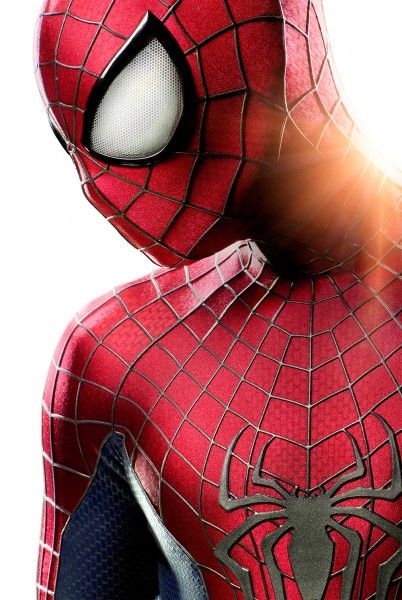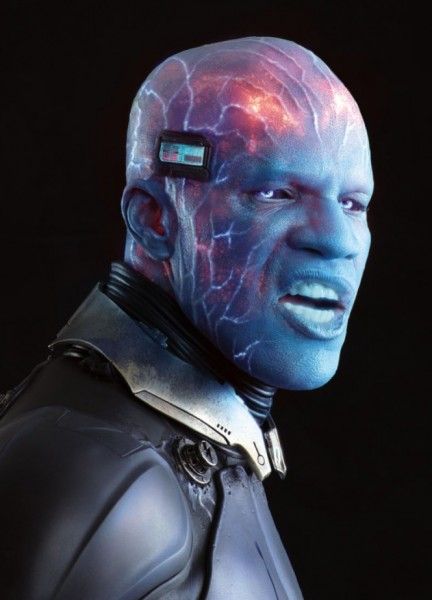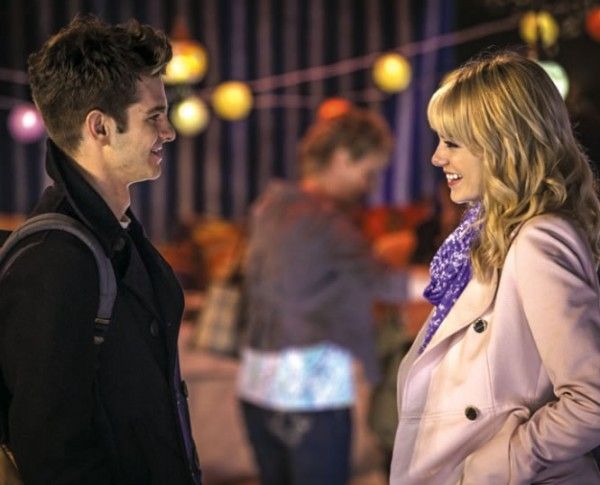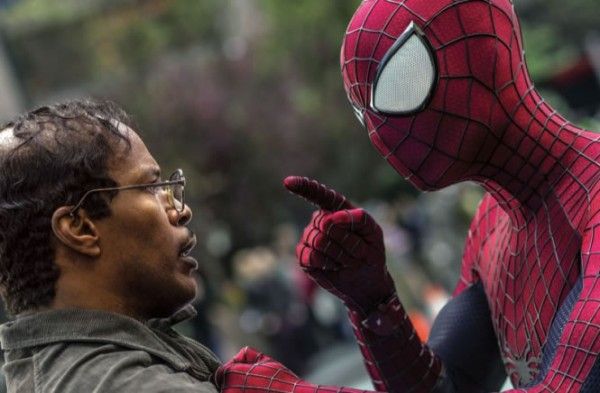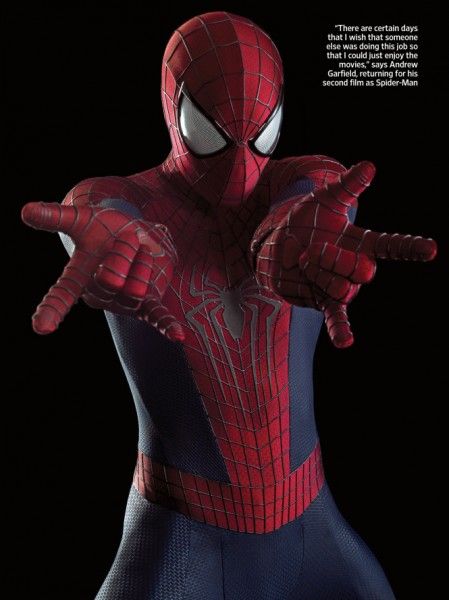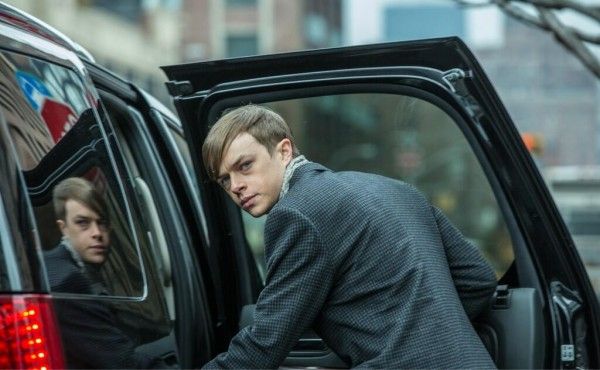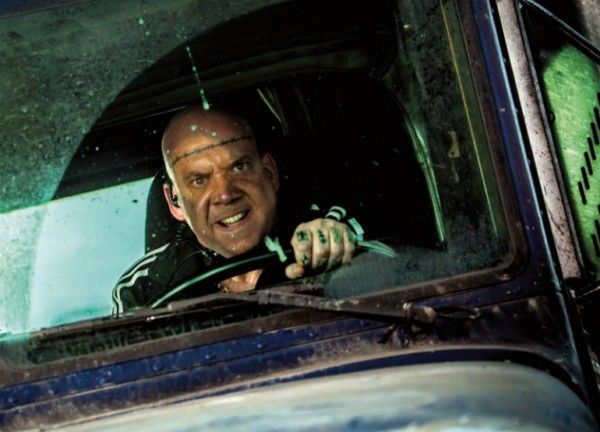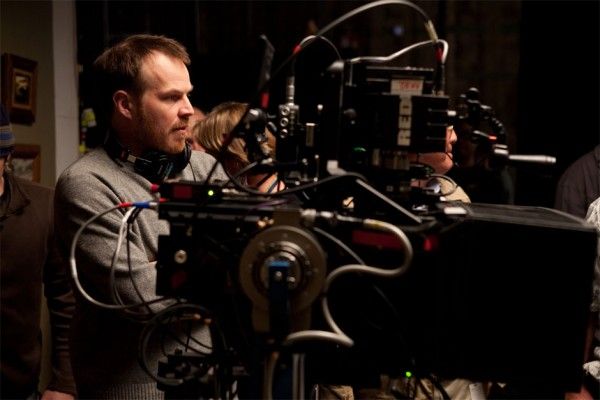As Spider-Man swings into Comic-Con this weekend for a presentation in Hall H, we had a chance to talk to stars Andrew Garfield, Jamie Foxx and Dane DeHaan and director Marc Webb about The Amazing Spider-Man 2, the sequel to the 2012 blockbuster which rebooted the series. The film chronicles the continuing adventures of Peter Parker (Garfield) aka Spider-Man and introduces Electro (Foxx) as a formidable new opponent.
During the interview, they talked to the press about what inspired the incarnation of Electro, what it’s like bringing to life an iconic villain, what their experiences on the first film allowed them to bring to the sequel, how the relationship between Peter and Spider-Man has evolved, and why Spider-Man has always been a hero for the underdog regardless of race or sexual orientation. Webb also discussed the challenge of directing a film with this hugeness of scale, what he learned from Alfonso Cuarón about surrendering to the material, and why he’s reluctant to reveal too much about the future direction of the franchise. Check out what they had to say after the jump:
Marc, what were the elements of the Spider-Man character and story that you couldn’t get to in the first one that you were really excited to be able to do this time?
Marc Webb: Well, there’s a level of virtuosity in his physical capabilities that we really had fun playing around with. There was a foundation of playfulness in this movie. There were hints of it in the first movie, but like fun. Fun is crucial. For the first movie, we had a lot of obligations. It was a little darker. But this one, from the outset, has that level of play in it that I loved in Spider-Man growing up. There were a lot of things that we did. For example, just the physical comedy elements of it, which are very technical, very difficult. We had a guy that Andrew had suggested who came in and consulted with us in creating these sort of elaborate, simple but elegant sequences where Peter Parker/Spider-Man is having fun being Spider-Man. Physical comedy is something that’s sort of a lost art, and Andy Armstrong, Cal and I, we all went back and looked at a lot of Buster Keaton movies, a lot of Charlie Chapin, a lot of Harold Lloyd, and you look at these incredibly gifted artists and engineers back then and how difficult the physical tasks of comedy like that was. It was something that we wanted to mess around with and there are a few scenes that we did where we had to do long takes. There was that one we did in the hallway. I don’t know how many takes we did, but it was just incredibly demanding of Andrew, but also intensely pleasurable as a filmmaker. I think people will appreciate that. Whether they notice the level of detail or the work that we put into it, I don’t know. But that was something that was fun to play around with that we didn’t get to play around with in the first movie.
I really love the design of Electro. Can you tell us how you came up with it? Did Jamie have any input into it?
Webb: There are a lot of different incarnations of Electro in the comics, and I tried to think about how to do it with a yellow and green suit, and I just couldn’t think in any sort of logical sense about that. There are certain elements of his creation that I want to protect, but I will say that when you look at a storm cloud coming over the horizon, I remember growing up in Wisconsin and seeing these terrifying storms coming over the plains, and the electricity on the inside of them would explode, and you’d see these flashes of billowing light, and that is a cue that we used to develop the internal workings of Electro. The other thing is I felt it was important to understand the message, the face, the emotion of, and preserve Jamie’s performance within the character itself. We stepped away from doing a mask and instead created this creature that felt human but also felt god-like. That was something that I think was really important to present to Spider-Man as an antagonist, something that was terrifying and a little bit creepy and immensely powerful.
Jamie, can you talk about your interpretation of the character of Electro?
Jamie Foxx: We wanted Electro to be serious. I wanted him to be a formidable opponent. Even when I would see Andrew out, I saw him at Chelsea Piers, and I said, “Somebody really doesn’t like you” and he said, “Who’s that? Who really doesn’t like me?” So I told him. I said, “I really want Electro to be angry.” I actually got the character from something that happened to me when I was in L.A. As a young comedian, I had a little situation. There was this gangster dude who said, “If you ever need some help, let me know.” I needed his help one day, and I took the help, but then I was indebted to him. Every club I went to, he’d go, “You got me, right?” And I was like, “Uh huh.” “Yeah. I need to get into the club with you.” And I said, “I can only get one in.” He said, “I got nine with me.” I was like, “Ugh.” And so, it was just this constant thing going through the city, and finally I had to stand up and say, “Hey, I don’t want to deal with you anymore.” And then, it turned on this villain. So I took that character as Electro. When Spider-Man says to Max, “We’re partners,” he said it in passing, but I took it to heart. When I turn into Electro, I don’t want to let him off the hook, and I think that’s what works. It makes the fight more epic the fact that Electro is not talking a lot. He’s just down to business. He wants to burn the city down and he wants to get rid of Spider-Man.
Actors who play iconic villains sometimes say it was fun for them while others have a very different experience and found it very disturbing? How did Electro affect you?
Foxx: We wanted to do three things with Max. We wanted to have three things happening. He needed to be betrayed by love; he needed to be betrayed by family; and he needed to be betrayed by his work. What happens is we came up with the fact that it’s Max Dillon’s birthday, and even his mom doesn’t remember his birthday. So you see? See how you feel? That sets it up, the fact that he says, “Mom, it’s a very special day today. You got anything you want to say?” She says, “No, I don’t want to say anything to you.” What that does is that sets it up so that when Electro does turn into this guy, there’s a little bit of you saying, “I understand where it’s coming from.” It wasn’t disturbing, but it was great to see that journey and the fact that we gave it more than one side. It’s three to four dimensional. When he turns into this person, you understand where he’s coming from.
You’ve played in a lot of iconic films like Ray, Django Unchained and Any Given Sunday. How do you feel taking on this type of role which is completely different and what did you do to prepare for it?
Foxx: First of all, the nailing of Max is the main thing. I know people like Max. There was a guy names Rashard who lived with his mom in his forties. If you know the history of Max, you know his father left him. We don’t go into that, but he was actually married at one point, and the reason being because he couldn’t get going. And so, for an actor, that’s perfect for guys like us. There’s a building block right there. If you know that this guy’s lost his father, immediately there’s something about his character that’s different. If you know that his mother dotes over him all the time and he’s always seeking his mom’s approval, which is a little bit like mine. I was adopted at seven months. My mother, I knew though at the time. I would always wait for her to come into town. “I’m playing quarterback and I’m this and I’m that.” I was waiting for her to say, “I like that.” She was a very tough woman. She now lives with me and now everything is worked out, but at that time, it was tough for me because I wanted her approval. It’s the same with Max. If we can grab that, for us as actors, and what was great about Marc was once we set that platform of Max being from that, the Electro part was not easy, but it makes sense. What was great was Marc would not allow us to move until he actually got it right. I don’t know what you guys experienced, but he pushed me. I don’t know if he pushed me a little harder than everybody else, but he pushed and I really appreciated that, so that when we look back on what we shot, that’s the main ingredient from all of the characters that we played, whether it’s Ray or it’s Django or Willie Beamen. That’s the same DNA or the same process that we’ve used in all of our character work.
Andrew, coming back to this sequel for the second time around, is the relationship between Peter and Spider-Man still just as difficult and complicated?
Andrew Garfield: What I discovered on this one is that it’s just a mess. Peter is a mess. Spider-Man is a mess. But what’s important to know is that when we meet Spider-Man at the beginning of this film, he’s taking great pleasure in his power and he’s in full control of it, a little bit like Usain Bolt and his 25 minutes before he runs the 100 meters, his preparation plan, because he has the ability to do that. He accesses a very relaxed, free, playful state of mind. What I love about this Spider-Man now is that he has the confidence to not only be heroic, but it’s not boring. He’s able to mess with people as he’s being heroic. He’s Bugs Bunny to a certain degree. And also, what I discovered is that Peter is his little brother in a way. He’s in the shadows and Spider-Man gets all the power, the attention, and he gets to live out his fantasy life. When he gets home, Peter has all the bangs and the bruises and the aches and the pains, and the adrenalin has left his body, and he has to look in the mirror, and he has to see a real boy in the mirror as opposed to this symbol that’s greater than any human being. That dynamic is really, really interesting – this inner dynamic between the older brother and the younger brother. It’s complicated as it should be. Peter Parker has historically been complicated, and the more complicated, the better. The more guilt, the better. The more pain, the better for Peter. And the more joy and pleasure for Spider-Man, the better. Those two things were really fun to play.
What was the most important lesson that you learned coming out of the first movie as an actor playing this character? Is there something that has helped you now with the second film?
Garfield: I learned so much from that first movie. I didn’t sleep on the first movie. I really took the responsibility to heart. I took Stan Lee’s words to heart, and I still do. I guess what I tried to do on this one was make sure I could show up every day and give all of myself to it. There were certain days on the first one where I felt like I couldn’t get to the place that I wanted to get to emotionally, or I couldn’t get to the place where I wanted to get physically. I just felt burnt out. On this one, I wanted to treat myself like an athlete and take rest when I could. And luckily, on this one, I could because Alex Kurtzman and Bob Orci with the help of Marc, Matt, Avi, and the whole team had crafted a story that didn’t solely rest on Peter’s shoulders or Spider-Man’s shoulders. Alex and Bob wrote incredibly well-crafted characters across the board, a real ensemble, and enough to attract talent like this and Paul Giamatti. It’s a real testament to the writing, and I got to sleep a little bit more, thankfully.
Can you talk a little bit about how Peter and Gwen’s relationship evolves in this movie?
Garfield: It relates to what I said earlier. It’s hard to have a life as Peter. It’s tough. It’s like being an emergency aid worker. It’s 24/7. His job has no breaks. You’re always on call. And it’s not that you can switch your beeper off. Who has a beeper anymore?! I’m like the original Stan Lee Spider-Man in the 1960s. I can’t switch it off. It’s a physical impulse that Spider-Man has. It’s like, “I have to go.” So I could be in the middle of a proposal. I could be proposing to Gwen. I could be on one knee, and then suddenly, “I really have to go. Sorry, sorry! Don’t hate me! I love you! I love you! I have to go and save a cat from a tree.” It’s that small and because of his overdeveloped sense of responsibility. He’s human. He’s not superhuman ultimately. He’s just a dude and relationships are hard anyway as we all know, but it’s especially hard for someone who has to be so dedicated to his work, and that’s part of the struggle that Peter has with Gwen in this story.
How does your new costume compare to the old one and do you like it?
Garfield: The eyes are much bigger and better. You can see more. It’s still as tight as it was before. I was able to urinate in this one. That was a very friendly adjustment from the costume designer, Debra Scott. Aesthetically, I prefer it. To be honest, I just dig it more. I loved the first one. Don’t get me wrong. I actually really did, but it’s mostly my ability to urinate which I’m happy about. It was just very generous of them to set it up in that way.
Dane, what was your Spider-Man experience like? What was it like working with Metallica?
Dane DeHaan: Honestly, I didn’t know what to expect going into it because I had never made a movie this big. But I definitely wasn’t expecting to enjoy it as much as I did and walk away being as fulfilled as I was. I knew, going into it, that I was a big fan of Andrew and the first movie, and Andrew as an actor, and Jamie obviously, and what Marc Webb had done with his first two movies. I guess I thought because of the magnitude of the movie, something artistically would be compromised. Actually it was a great luxury to have that much time and for the sets to be that amazing. And then, with the script being as great as it was, I walked away fully satisfied. And Metallica was awesome, too.
In the previous incarnation, we had James Franco playing Harry Osborn. A lot of what drove him is what happened to his father and it turned him. Is there a different trajectory here? Can you talk about how your character interacted with Peter Parker?
DeHaan: Well, first off, in this version, Peter and Harry were childhood friends, and then Harry was sent off to a boarding school at a young age. He inherently has a complicated relationship with Norman still. He never really went home. He stopped and just ignored his home life and stayed at school and partied and probably got into a lot of things he shouldn’t have gotten into. He started to try to buy his happiness because he had a trust fund. And now, he’s graduated high school and he’s decided to go home for the first time, and he has to confront Peter and he hasn’t seen Peter in a really long time. They are trying to reconcile their friendship. A lot of what they find that they have in common is their complicated relationships with their fathers still.
Do you interact more with Max or Electro in this film?
DeHaan: (laughs) We have some interactions.
Andrew, there’s a lot of merchandising associated with Spider-Man. What’s it like to see yourself as an action figure?
Garfield: I try not to look. But then, I went into Toys R Us last Christmas when I was shopping for my nephews, and I was like, “I’ll meet you guys in the car.” I needed a half hour to just absorb one particular aisle. It was humbling, just really, really humbling. It’s not something that I identify with. It doesn’t feel real. It doesn’t feel like me. But it was really cool. It’s just cool. It’s as simple as that. But also, it doesn’t really mean anything, weirdly. It’s a suit. Kids are going to be excited to buy the Spider-Man figure when he’s got his mask on. Yes, people are going to have a Peter Parker, but it’s not about the actor playing the role. It’s about the everyman nature of Peter and the everyman nature of Spider-Man and what he stands for and who he protects – all creatures great and small. And that’s what’s exciting. The fact that I get to try to embody it and try to bring it to life for five and six-year-olds, that’s just an honor for me and one that I don’t take lightly or that personally actually.
Marc, for this bigger Spider-Man world and the sequels that are out, was it harder to make this film feel contained rather than a way in to the next sequel?
Webb: It’s a lot of different things. The universe that we had conceived of began before we started treating the first movie, so there are plans and plants and seeds that had developed all around us, but the primary focus was just executing this movie as best as we all could. Contained is an interesting word. This is operatic. There’s a hugeness of scale to this movie, and as Andrew was saying, the ensemble is pretty extraordinary, but it is cohesive and it is direct, and there is a single unifying theme that is at the heart of the film that will be very impactful. But it was fun. It’s fun to tease out little bits and pieces of other characters. If you pay attention to this next movie, you’ll see other things that might be in store for us in the future.
What do you feel you learned in the first movie about yourself and how did that affect your personally on the second one?
Webb: A movie of this size is so consuming. I met Alfonso Cuarón yesterday who is a brilliant filmmaker. I’ve been a longtime fan of his. He said something when he was talking about doing Harry Potter which I thought was really profound and very helpful to me as a filmmaker. With 500 Days of Summer, it was very much a personal story with me and my friends. But when he was talking about Harry Potter, he’s like, “You come in and you’re the director and you have to have a vision and usually it’s about you.” He said something about Harry Potter which I thought was very nice which was, “You have to surrender to the material.” I am at the service of something much bigger than myself. It’s not about me. It’s not about my vision necessarily. It’s about supporting a character that we all know and love that’s so much bigger than all of us. And learning how to surrender to that is a very difficult thing when your job is to be in control. To negotiate with that, I’ve had many, many life lessons that I won’t get into. But it was a really wonderful thing because what you learn is that when people feel a sense of ownership, whether it’s Andrew, Dane or Jamie or Matt or Avy, you get a level of commitment that is much deeper than you could do if they’re servicing something else. For me, I think it was learning the power of surrendering.
Andrew, I was just curious if you’ve made any headway on finding Peter Parker a boyfriend?
Garfield: When I said that in that Entertainment Weekly interview, it was a question. It was just a simple philosophical question about sexual orientation, about prejudice. Obviously, I long for the time when sexual orientation and skin color is a small thread in the fabric of a human being, and all men and women are created equal. To speak to the idea of me and Michael B. Jordan getting together, it was absolute tongue in cheek. It would be illogical for me in the third movie to be like, “You know what? I’m kind of attracted to guys.” That’s just not going to work. That’s clear. It was just more a philosophical question. What I believe about Spider-Man is that he does stand for everybody – black, white, Chinese, Malaysian, gay, straight, lesbian, bi-sexual, transgender -- and he will put himself in harm’s way for anyone. He is colorblind. He is blind to sexual orientation. And that is what he has always represented to me. He represents the everyman, but more importantly, maybe he represents the underdog and those marginalized, those who come up against great prejudice, which I as a middle-class, straight white man don’t really understand so much. When Stan Lee first wrote and created this character, the outcast was the computer nerd, the science nerd, the guy that couldn’t get the girl. Those guys now run the world. So how much of an outcast is that version of Peter Parker? That’s my question. I just love for the underdog protecting those that need protection. In terms of teenagers nowadays, there are all the horror stories you hear about young gay men and women not feeling accepted by society, attempting suicide, committing suicide in some cases. Who else is there to stand up for more importantly than them? Equally to everyone else, but we’re all the same is my point.
Marc, are you thinking ahead to the upcoming movies?
Webb: Yes.
What can you tell us? What can we look forward to?
Webb: You’ll have to wait and see. Listen, just to address that, we really want to be protective of the plot of the movie. We want to protect the enjoyment that people should have when they walk into a theater and experience it for the first time. That’s a really fun thing to do. So, rather than being coy and dodgy, that’s really what our intention is. There is a lot of thought, a lot of consideration, a lot of detail work, a lot of meetings behind closed doors about how the universe unfolds, but we’re going to be very protective about that and how we reveal that information.
I’m disappointed that Shailene Woodley is not going to appear in this movie, but excited about the idea of a longer term plan. Will Shailene still have a part for Spider-Man 3?
Avi Arad: We miss Shailene, and I know you will understand that we all felt that Sony got [inaudible] to have two girls. We always get this complaint about too many this, too many that, so it was the right thing to wait with it. The next movie will be in three years from now, more or less.
Marc Webb: We haven’t talked about it that much. We’ve got to finish this movie first.
Arad: We love this girl and time will tell.


